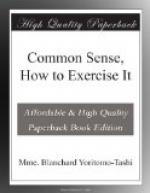“That which is not understood is easily criticized, and practical sense would prevent an orator from attempting to establish an argument whose premises would offend common sense.
“He would be certain of failure in such a case.
“His efforts will be limited, then, to evoking common sense, by employing practical sense, so far as what refers to the application of principles which he desires to apply successfully.”
Yoritomo recommends this affiliation for that which concerns the struggle against superstition.
“Superstition,” he says, “offends practical sense as well as common sense, for it rests on an erroneous analysis.
“Its foundation is always an observation marred by falsity, establishing an association between two facts which have nothing in common.
“There are people who reenter their homes if, when they reach the threshold, they perceive a certain bird; others believe that they are threatened with death if they meet a white cat.”
Without going back to the days of Yoritomo, we shall find just as many people who are the victims of superstitions concerning certain facts, which are only the observance of customs fallen into disuse, and whose practise has been perpetuated through the ages, altho, as we have said in the preceding chapter, the purpose of the custom has disappeared, but the custom itself has not been forgotten.
It is in this way that the origin of the superstition concerning salt dates back to the time of the Romans, who (while at variance with the principles of contemporary agriculture) sowed salt in the fields of their enemies and thought that by so doing they would make them sterile.
To that far-distant epoch can be traced the origin of the superstition concerning the spilling of salt.
Whatever may have been its cause, superstition is the enemy of common sense, for, when it does not originate in an abolished custom, it is the product of a personal impression, associating two ideas absolutely unconnected.
“Practical sense,” Yoritomo continues, “is a most valuable talent to cultivate, for it prevents our judging from appearances.
“Frivolous minds are always inclined to draw conclusions from passing impressions; they adopt neither foresight, nor precaution, nor approximation.
“There are people who will condemn a country as utterly unattractive, because they happened to have visited it under unfavorable circumstances.
“Others, without considering what a country has previously produced, and that at present the grain has not been planted, will declare unfertile the soil which has been untilled for some months.
“On the other hand, if they visit a house on a sunny day, it would be impossible for them to associate it with the idea of rain.
“It would be most difficult to make these people alter their judgment, prematurely formed, and, in spite of the most authoritative assertions and the most self-evident proofs, their initial idea will dominate all those which one would like to instil into their minds.




